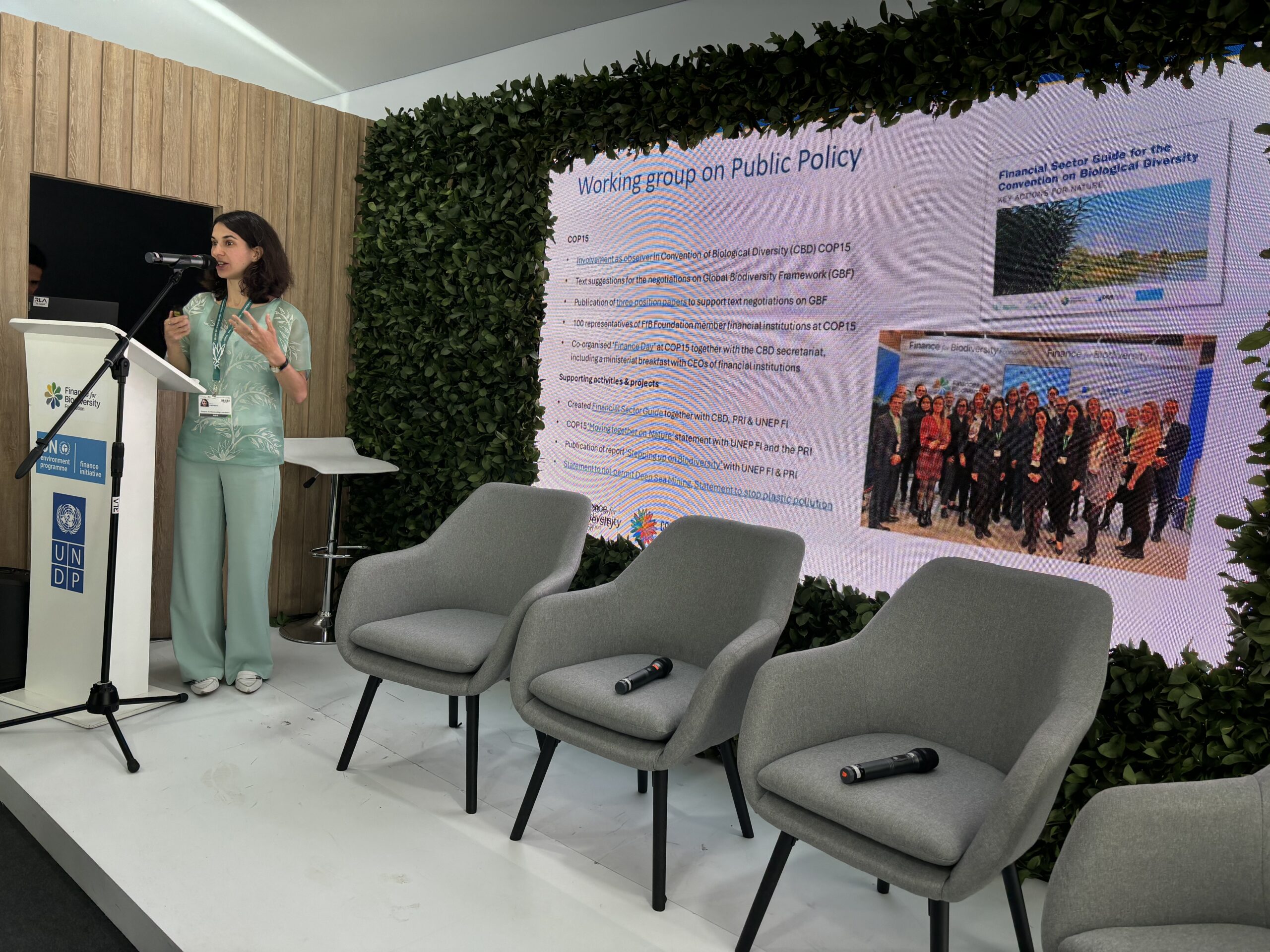FfB Foundation sessions at the Finance and Biodiversity Pavilion at COP16
At COP16 in Cali, Colombia, the Finance for Biodiversity Foundation (FfB) curated and co-hosted a series of events at the Finance and Biodiversity Pavilion, fostering dialogues and partnerships focused on aligning finance with global biodiversity objectives.
Kicking off the week on 23 October, we hosted an Information Session on FfB, where attendees delved into the Foundation’s mission, learned about the work of various member-driven working groups and discussed opportunities for creating nature-positive financial solutions. This interactive session sparked valuable discussions, with prospective members learning about the FfB Foundation’s initiatives and Pledge.
On 25 October, the Finance for Nature Positive: Monitoring and Mobilisation of Financial Flows event, co-hosted by the FfB Foundation and UNEP FI, aimed to solicit feedback on the discussion paper of the same name and provide guidance on how financial institutions can contribute to implementing the Global Biodiversity Framework (GBF).
The event featured a welcome by Jessica Smith from UNEP FI, followed by a presentation on the Finance for Nature Positive working model by Natacha Boric of the FfB Foundation. Irina Likhachova from the IFC then presented the Biodiversity Finance Metrics for Impact Reporting. The panel discussion, moderated by Jessica, included representatives from BNP Paribas, Climate Asset Management, the Nature Positive Initiative and the World Bank Group, who discussed the mobilisation and monitoring of private financial flows towards GBF goals.
During the Q&A, panelists shared insights on their reactions to the presentations, discussed current projects related to the “Nature Positive” concept, and explored how these initiatives could contribute to improving the state of nature. The session concluded with remarks from Caroline van Leenders of RVO Netherlands, emphasising the importance of collaboration in mobilising financial resources for biodiversity, followed by a Reception where Pavilion partners and attendees strengthened their networks over shared goals.
The 26 October event, The Elephant in the Room: Nature and Data, introduced FfB Foundation’s Biodiversity Data Platform (version 1.0), aimed at guiding institutions in selecting reliable biodiversity data for impactful decision-making. Following the presentation, a panel of data providers and financial institutions discussed the challenges, solutions, and opportunities associated with nature-related data. The event underscored the importance of reliable data for financial institutions in assessing impacts and dependencies, setting targets, and taking necessary actions to achieve their nature-related goals.
Later that day, a session on Biodiversity Impact and Dependency Assessments in the Finance Sector: The Time to Act is Now featured the launch of our updated biodiversity measurement guide, tailored for financial institutions and companies. This important event was hosted by the FfB Foundation and highlighted the critical need for improved measurement approaches in the finance sector.
On 27 October, Integrating Nature into Sovereign Debt, co-hosted by FfB, UNDP BIOFIN and UNEP FI, convened financial institutions, governments and multilateral organisations to discuss incorporating nature considerations into sovereign debt frameworks. This session brought together voices from organisations like Robeco, AFD, S&P, NGFS and UNDP, with panelists emphasising the importance of bridging the gap between financial markets and sovereign issuers, especially in biodiversity-rich developing countries. The discussion covered the challenges and opportunities of aligning sovereign debt with nature goals, underscoring how better-integrated national biodiversity strategies can support sustainable funding for critical conservation and restoration efforts.
Later that day, Alignment of Financial Flows with the GBF: From Ambition to Implementation built on the work of the FfB Foundation’s Public Policy Advocacy working group, calling for greater government ambition in implementing the Global Biodiversity Framework (GBF) and aligning financial flows with its goals and targets. The panel encouraged dialogue with negotiators about transitioning economic sectors through strong policies, regulations and incentives to halt and reverse biodiversity loss.
On 29 October, a session on Target Setting on Nature: Perspectives and Good Practices introduced FfB’s Nature Target Setting Framework for asset managers and owners. Moderated by Emine Isciel from Storebrand AM, the session featured speakers Lucian Peppelenbos (Robeco), Mads Steinmüller (Danske Bank) and Brian Kernohan (Manulife Investment Management), who shared strategies for developing impactful biodiversity targets within investment portfolios. On 30 October, Central Banks and Supervisors Actions on Nature-Related Financial Risks and Transition Planning, hosted with NGFS, brought forward regulatory perspectives on tackling nature-related risks, followed by Financial Strategies and Products for a Positive Impact on Nature, which showcased innovative financial models that align with the GBF’s Target 19.
Concluding COP16 on 31 October, FfB Foundation hosted The FfB Pledge: Signatories & Good Practices, welcoming new signatories and spotlighting best practices from members working towards biodiversity commitments. The final event, Forests Finance: A Key Solution Against Climate Change, Biodiversity Loss and Inequality, underscored the finance sector’s role in supporting forest conservation efforts.
During these days, members like Rabobank, Federated Hermes Limited, Silverstrand Capital, Aviva, Storebrand Asset Management and eco.business Fund had the opportunity to showcase how they are incorporating nature-positive goals into their activities, portfolios and decision-making processes.
Through these carefully crafted sessions, the Finance for Biodiversity Pavilion served as a vital hub for knowledge exchange, collaboration and action towards sustainable finance for biodiversity conservation.





